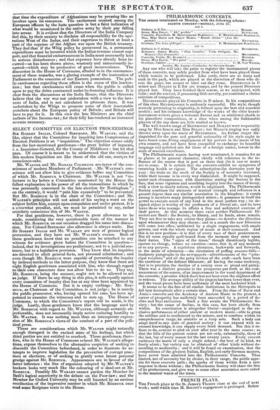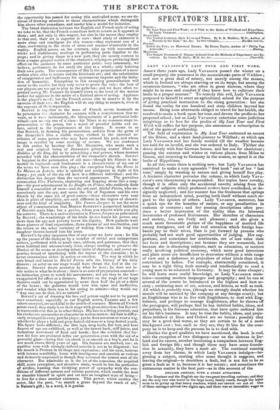FRENCH PLAYS.
THE French plays at the St. James's Theatre close at the end of next week ; until which time Id. BODFFE'S engagement is prolonged. Before
the opportunity has passed for seeing this unrivalled actor, we are de- sirous of drawing attention to those characteristics which distinguish him above other comedians, and render him a model for imitation. The broad distinction between the English and French style of acting we take to be, that the French comedians imitate nature as it appears to them ; and not only in this respect, but also in the means they employ to that end, their art is superior to ours : their study of character is more close and intelligent for this reason—they represent one of a class, conforming to the traits of dress and manner observable in the reality. English actors, on the contrary, take up with conventional tricks and traditionary readings in performing parts familiar to the stage ; and in giving shape to a new part, they are mostly content to form a vague general notion of the character, relying on producing their effect on the audience by some particular point very commonly, we believe, performers do not study the play as a whole ; only learning i
the own parts. The consequence of this is the perpetuation of a man- nerism alien alike to nature and the histrionic art ; and the substitution of exaggeration and buffoonery for spontaneous impulse and the imita- tion of humanity. Exceptions to this sweeping generalization will occur to the reader, but they only serve to prove the rule : the best of our players are too apt to play to the galleries ; and we have often re- gretted seeing Mr. FARBER let himself down to the level of the merest seeker for applause in the midst of a finished piece of acting. Applause is the player's raced: but the French actors aim to deserve it by the exercise of their art ; the English will do any thing to secure it, even at the expense of their reputation. Boussi is superior to the mass of French actors inasmuch as be personates the character he assumes with a completeness that re- veals, as it were incidentally, the idiosyncracies of a particular indi- vidual—not merely one of a class : his Miser is no common stage re- presentation of the genus, but a miser of peculiar habits and na- ture, suited to the requirements of the drama. It seems to us that BOMA, in forming his personations, unfolds from the germ of the dramatist's idea a visible shape, clothed in the external at- tributes of some person who may have crossed his path, and whose image is recalled by some analogy of nature. We are confirmed in this notion by hearing that Mr. MEADOWS, who made such a real and original being of JERROLD'S grinning usurer Shark in Bubbles of the Day, did so by mimicking a real person whose manner accorded with the characteristics of the dramatist's sketch. BOUFFE is happiest in the personation of old men—though his Gamin is im- mortal in boyhood—and bonhommie is a characteristic of six out of the seven we have seen him play ; the exception being the Bossu in Le Maison en Loterie, who is spiteful and malignant in right of his bump : yet each of the six old men is a different individual : and the distinction lies deeper than the outward appearance. The garrulous centenarian Pere Turlututu, chattering and hopping about like a mag- pie—the poor schoolmaster in Le Boujin du Prince, who suddenly finds himself a councillor of state—and the old cure Michel Perrin, who un- consciously acts the spy, and saves the life of Napoleon and his own friends by the same act of good-nature—three characters very near akin in point of simplicity, are each different in the degree of shrewd- ness and the kind of simplicity. His Pauvre Jacques is not the mere object of commiseration that MORRIS BeaNcres pauperized imitation of BOUFFF made him; but a genius, whom you respect while you pity his sorrows. There is a native elevation in Pauvre Jacques as personated by BOUFFE; the wanderings of his brain do not lessen his power, any more than his age and poverty lower his dignity. How pathetic were those glances of fond expectation, those gleams of sad recollection, and the return to the sober certainty of waking bliss when his long-lost daughter throws herself into his arms. BotrFFi's by-play surpasses that of any actor we have seen : he fills up the pauses of the dialogue by a number of trivial and unimportant actions, performed with so much ease, address, and quietness, that they seem habitual and unconsciously done, always tending to preserve the illusion of the scene or develop minor traits of character, and never ap- pearing forced or interfering with the repose of the ensemble : he is never ostentatious either in action or emotion. The way in which he cuts bread and butter in Michel Perrin tells the history of his daily dinners : an actor on our stage would have thrust the loaf at the au- dience. BOUFFF rivets attention by what be does ; he does not in- vite notice to what he is about : there is no note of preparation sounded— no intimation given to watch his movements ; nor are they in the least exaggerated for effect at a distance. BouFFi on the stage of our huge theatres could not be appreciated by more than half the pit or a third of the boxes ; the galleries would vote him tame and ineffective, and wonder what there was in his acting to admire—they would say "Any one can do that, it's so natural !" BOUFFF'S art of dressing his face and person ought not to be passed over unnoticed ; especially as our English actors, FARREN and a few others excepted, are unskilful in the article of costume. Herein all French actors excel; they study it on their stage with great attention; but BOUFFF IS transcendent in this as in other things. His face is a living portrait, and Ins clothes are accessories to character as well as station: his hair is differ- ently arranged in every part he plays ; yet he does not seem to wear a wig, whether he plays a bald and grey-haired old man or a long-haired youth. His figure looks different ; the thin legs, long heels, flat foot, and bent Angers of age are exhibited, as well as the bowed back, stiff joints, and tremulous movement of head and hands : how the wrinkles that fur- row his face are produced defies our penetration even with the aid of a powerful glass—seeing that his cheek is as smooth as a boy's, and he is not much above thirty years of age. His features are marked, too : an a9uiline nose with strongly-defined-nostrils is not to be disguised ; but his mouth is Protean in its shape and expression ; and his eyes, lustrous With intense sensibility, beam with intelligence and emotion as various and delicately-expressed as though they mirrored the inmost soul of the character. But admirable as is the art of the comedian, the acquired skill, acute perception, and attentive study, would be but the perfection of artifice, wanting that vivifying power of sympathy with the con- ditions of different natures and various passions, which enable the man to transfer himself in spirit and act into an imagined state of being— to live for a time another existence. This power, which enables the actor, like the poet, "to snatch a grace beyond the reach of art," is Nature's gift ; in a word, it is genius.



























 Previous page
Previous page